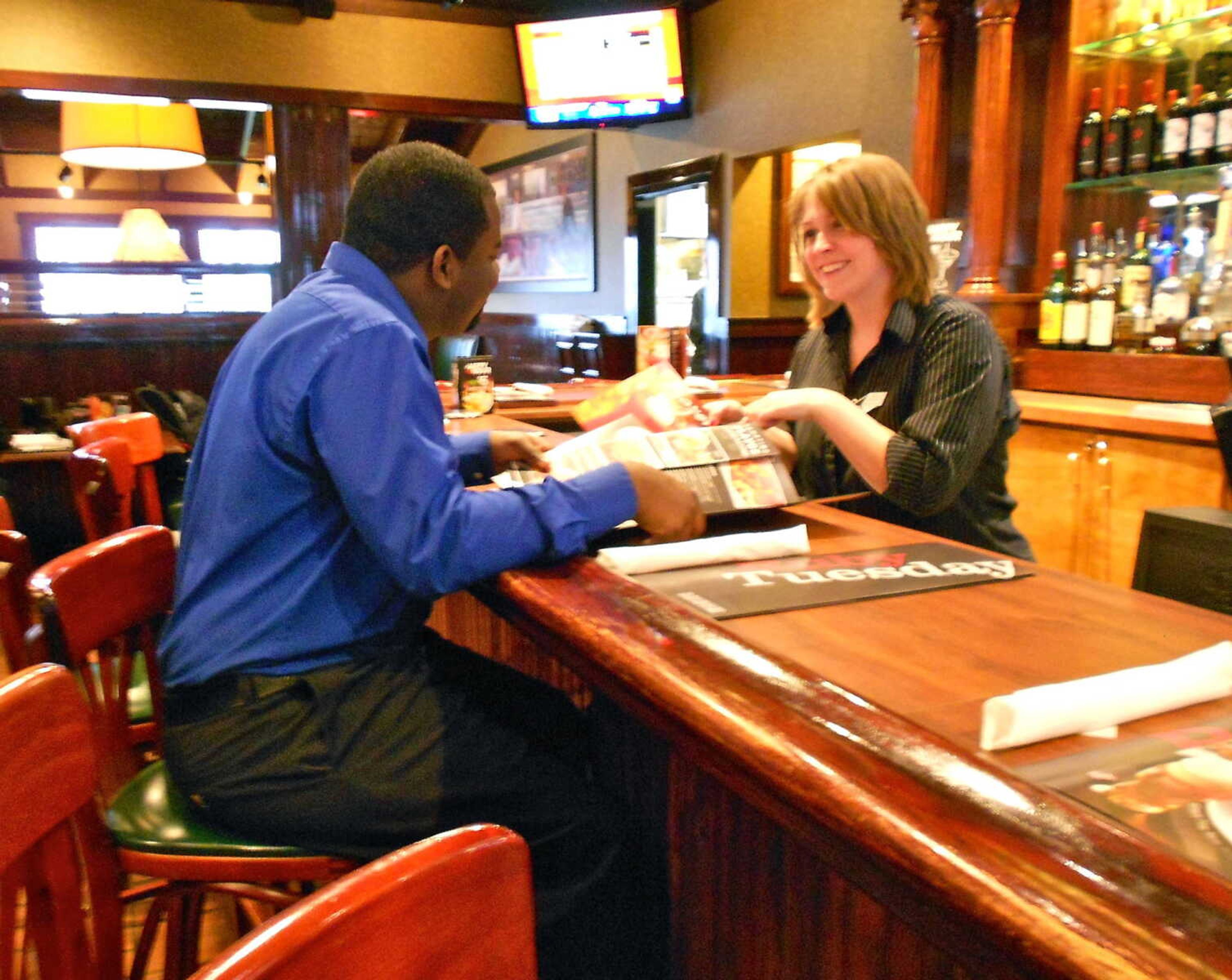Missouri minimum wage increases 10 cents
This year, Missouri increased the minimum wage from $7.25 to $7.35. An extra 10 cents an hour is only another $4 a week for a full-time Ruby Tuesday employee like Schweain.
Shawna Shweain spends her days at school working on her French education major at Southeast Missouri State University and her nights and weekends at Ruby Tuesday working to get her bills paid. Servers, like Schweain, don't often have down time and spend long hours on their feet.
Schweain is a server and bartender at the Cape Girardeau location of the chain restaurant. She is paid the server minimum wage of $3.67 an hour, but she mostly depends on tips from customers. This is dependent on not only her performance but business and the kindness of strangers. If servers don't make enough in tips, Missouri employers are required by law to catch them up to minimum wage.
This year, Missouri increased the minimum wage from $7.25 to $7.35. An extra 10 cents an hour is only another $4 a week for a full-time Ruby Tuesday employee like Schweain.
In the bordering state of Illinois, minimum wage is $8.25. The dollar difference is attributed to higher cost of living in Illinois, but servers and minimum wage employees feel that meeting the cost of living in Cape Girardeau can be tough when they are getting paid just above $7.35 an hour.
Ruby Tuesday and other restaurants often make servers share a percentage of their tips with hosts and other employees like bussers to help pay their wages.
According to Schweain, working 40 hours and taking on a full-time school schedule is not ideal for a student who takes her studies seriously, but she really has no choice.
"Well, I mean in the long run, if you're working 40 hours a week that would add up," Schweain said. "[As a server] it doesn't always directly impact me, it could bring in more customers who help pay my wages. There are often times, especially in the summer, when people have less money, they don't go out as much and my tips can often equal out to minimum wage."
Schweain said that she feels like her weeks are jammed packed, where she often has to run from school straight to work and then heading home to do homework into the early hours of the morning. As a server and bartender she hopes to increase her chances to make more money in shorter periods of time.
"I love being a server," Schweain said. "It can be disheartening when you set a [money] goal for yourself for the day and you don't meet it you feel pretty bad. It usually evens out in the weekends."
Southeast Missouri State University economics professor Bruce Domazlicky said that a 10 cent increase in minimum wage is not really going to have much of an impact on workers or the economy, but over time these increases build up to something significant.
"You may see a 10 cent increase this year and a 15 cent increase next year," Domazlicky said. "Eventually these increase do make an economic impact."
Domazlicky explained that if the minimum wage increases too steeply it can affect the economy negatively because employers may try to reduce costs by laying off employees.
According to Domazlicky, states like Illinois that have a higher minimum wage can sometimes have trouble getting potential businesses to set up locations there, which can negatively affect the availability of employment.
Interior design major and host at Ruby Tuesday Erin Melvin often struggles to balance the need to pay the bills with her college obligations. Having to work has conflicted with extracurricular activities that she wants to be able to put on her resume. Melvin is the vice president of the Interior Design Student Association and the Construction Management Organization, and she said both clubs meet once every two weeks.
Melvin, who also participates in a weekly competition associated with these organizations, said that in a perfect world she could make it to all her obligations, but she has to make a living.
"I don't think that 10 cents is enough," Melvin said. "I am actually from Illinois, and I am used to getting $8 an hour minimum wage, and that was barely enough over there. I know the cost of living is little bit lower here but not that much lower."
Many students opt for on-campus jobs at Southeast to make ends meet. Student Employment coordinator Cassandra Hicks said that students that work on campus will receive the 10 cent increase on their wages. She explained that Southeast places importance on education so any student worker may not exceed 20 hours of on-campus work, when school is in session and 37 and half hours on breaks and during the summer.
"I think for the majority of students minimum wage is adequate," Hicks said. "Like with anything, you have to have a budget and be careful what you spend it on. Obviously there are some exceptions for students that are in difficult situations. But for the majority of the students I think the wage is appropriate."
Hicks said that students' focus should be on furthering their education, and that working too much may impede on their academic development.
"There are several factors that go into whether working over 20 hours will affect students school work," Hicks said. "But by and large most students would not be able to handle working more than 20 hours a week and keep up with their studies."
Hicks was a non-traditional student while she attended Southeast. She was married with children while getting her degree, so she and her husband decided that she wouldn't work while getting her undergraduate degree and that she would work part time while in graduate school. According to Hicks, it is difficult for the average student to keep up with school obligations if they are working almost 40 hours, but there are certainly those who can do it.
"If you are working 40 hours a week and you take a traditional 15 [hour] course load, you are supposed to be spending approximately 45 hours a week on your studies," Hicks said. "Working 40 hours on top of that, that is two full time jobs. There are not a lot of people out there that are going to be able to manage that."
Schweain and other students who don't have spouses or children still have to deal with mounting bills at apartments, grocery shopping, school supplies and car payments. Schweain said that she does scrape by, but she has seen those in her position that have to go without.
"I think that minimum wage right now doesn't meet the standard for living," Schweain said. "It is still not a livable wage. Feasibly, you can't get out of poverty at this rate of pay. You would have to get two 40-hour jobs."




